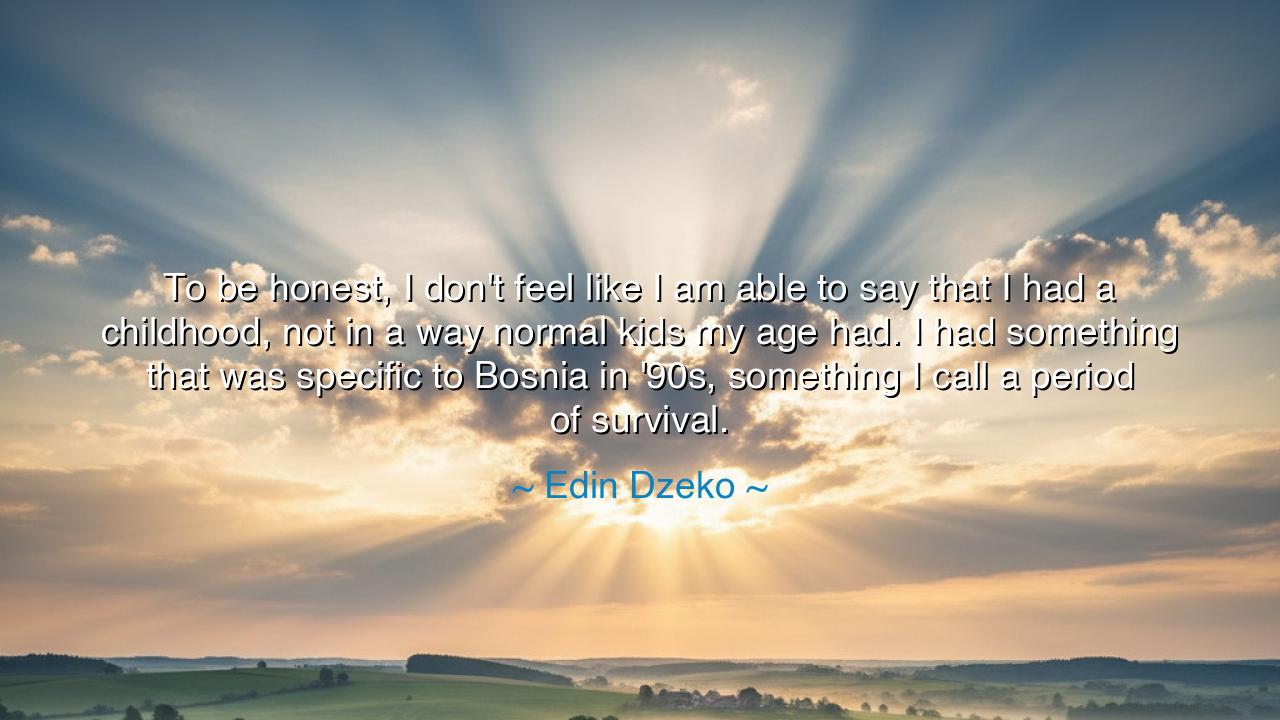
To be honest, I don't feel like I am able to say that I had a
To be honest, I don't feel like I am able to say that I had a childhood, not in a way normal kids my age had. I had something that was specific to Bosnia in '90s, something I call a period of survival.






"To be honest, I don't feel like I am able to say that I had a childhood, not in a way normal kids my age had. I had something that was specific to Bosnia in '90s, something I call a period of survival." – Edin Dzeko
In the unfolding story of human existence, there are moments of deep struggle that define generations, shaping the hearts and minds of those who live through them. Edin Džeko, a name known across the world as a football star, speaks of a childhood that was not filled with the innocence of play and carefree days, but rather with the harrowing experience of survival. In the heart of the Bosnian conflict in the 1990s, a generation was robbed of the simple joys of growing up, forced to endure a world that was at once violent, fragmented, and torn apart by war. This “period of survival,” as Džeko calls it, was not just a personal struggle but a collective experience that shaped the nation’s youth, leaving them with memories of trauma and resilience rather than of innocence.
To understand the depth of Džeko’s words, one must look back to the devastating Bosnian War that engulfed the former Yugoslavia in the 1990s. The violence that raged through Bosnia, its cities and villages reduced to rubble, became a backdrop for countless children who, like Džeko, found their youth interrupted by the relentless tide of warfare. The world they inhabited was one where childhood was not a period of learning and growth, but of constant adaptation and survival. For children of such a time, normalcy becomes a distant dream—a luxury that is inaccessible in a world consumed by conflict.
This loss of childhood is not unique to Džeko. In many parts of the world, there are countless stories of young people who have lived through similar trials. The tale of Anne Frank, whose childhood was stolen by the horrors of the Holocaust, offers a profound parallel. Frank, hidden in an attic, writes in her diary about the weight of living through a time of great fear and uncertainty. Like Džeko, Anne was denied the freedom to experience the world as a child should, instead learning survival in the face of atrocity. Yet, in both their stories, there is an enduring resilience—a determination to survive, to endure, and to find some semblance of humanity amidst the chaos.
The experience of living through such a period of survival is a deep wound that shapes not only the individual, but the collective spirit of an entire people. The wisdom of ancient cultures speaks often of such trials. The Spartans, for example, raised their children in the ways of war, teaching them survival through harsh discipline and the constant threat of battle. But the ancient Greeks also understood the importance of healing after such trials. They knew that while hardship may shape one’s character, it does not define the whole of a person. Just as Odysseus, after years of war and suffering, sought to return home and find peace, so too must those who have lived through such struggles find ways to heal, to reclaim their humanity, and to rebuild their lives.
In the context of the modern world, Džeko’s words remind us of the injustice of war—the ways in which it robs not only the lives of those directly affected, but also the future of the young. The cycle of trauma, once initiated, can echo through generations, impacting not just the individuals who survive but the entire society they belong to. The wisdom here, then, is not just in the recognition of suffering, but in the resilience of the human spirit. Even in the worst of circumstances, there is the potential for hope, for growth, and for recovery.
The practical lesson we must learn from Džeko’s reflection is this: never take for granted the peace and security of childhood. We must work relentlessly to ensure that future generations are not forced into survival but are allowed the freedom to learn, grow, and dream. For those who have lived through hardship, the path to healing is long, but it is through community, empathy, and shared resilience that true recovery is found. Let us remember that every child, regardless of where they are born or the circumstances they face, deserves the sanctuary of childhood—a time for growth, exploration, and innocence. We must not only protect these children, but offer them the opportunity to build a future that is free from the horrors that once defined their past.






AAdministratorAdministrator
Welcome, honored guests. Please leave a comment, we will respond soon